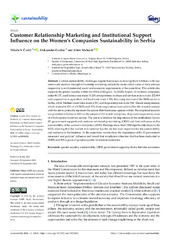Приказ основних података о документу
Customer Relationship Marketing and Institutional Support Influence on the Women’s Companies Sustainability in Serbia
| dc.creator | Ćurčić, Nikola | |
| dc.creator | Grubor, Aleksandar | |
| dc.creator | Muhović, Almir | |
| dc.date.accessioned | 2021-10-01T05:31:43Z | |
| dc.date.available | 2021-10-01T05:31:43Z | |
| dc.date.issued | 2021 | |
| dc.identifier.issn | 2071-1050 | |
| dc.identifier.uri | http://RIVeC.institut-palanka.rs/handle/123456789/399 | |
| dc.description.abstract | Current sustainability challenges require businesses to develop their relations with customers and markets through relationship marketing and jointly create added value of their services responsive to environmental, social and economic requirements at the same time. This article also supports the gender equality within the SDGs (fifth goal). As (SMEs Report, 2018) micro companies make 89.137, small enterprises make 11.219, entrepreneurs in shops and services sectors make 272.969 and cooperatives in agriculture and food trade make 1.196, they comprise most of the SMEs sector in Serbia, while Medium-sized firms make 2.517, and large enterprises make 540. Female entrepreneurs, which represent 32% of all SMEs and 22% from cooperatives were selected for the research sample with the aim to primarily represent the sectors their businesses operate within. The empirical research was provided in Serbia in 2021 on the sample of 220 female enterprises, shops and cooperatives, most of which operate in service sectors. The aim is to indicate the importance of the institutional factors (IF, government support) and customer relationship marketing (CRM) and their influence on the sustainability of the women’s enterprises (WES). Findings show that CRM significantly impacts the WES, showing that the market and customer loyalty are the most important for the sustainability and resilience of the business. At the same time, results show the importance of the IF government measures’ and policies’ influence and reveal that insufficient attention that has been dedicated to (WES) and SDGs goals of gender equality in feminist economics. | sr |
| dc.language.iso | en | sr |
| dc.publisher | Basel : MDPI (Multidisciplinary Digital Publishing Institute) | sr |
| dc.relation | info:eu-repo/grantAgreement/MESTD/inst-2020/200216/RS// | |
| dc.rights | openAccess | sr |
| dc.rights.uri | https://creativecommons.org/licenses/by/4.0/ | |
| dc.source | Sustainability | sr |
| dc.subject | gender equality | sr |
| dc.subject | sustainability | sr |
| dc.subject | CRM | sr |
| dc.subject | government support policies | sr |
| dc.subject | feminist economics | sr |
| dc.title | Customer Relationship Marketing and Institutional Support Influence on the Women’s Companies Sustainability in Serbia | sr |
| dc.type | article | sr |
| dc.rights.license | BY | sr |
| dc.citation.issue | 13 | |
| dc.citation.rank | M22 | |
| dc.citation.spage | 10824 | |
| dc.identifier.doi | 10.3390/su131910824 | |
| dc.identifier.fulltext | http://RIVeC.institut-palanka.rs/bitstream/id/1066/bitstream_1066.pdf | |
| dc.identifier.rcub | https://hdl.handle.net/21.15107/rcub_rivec_399 | |
| dc.identifier.scopus | 2-s2.0-85116106925 | |
| dc.identifier.wos | 000733756300001 | |
| dc.type.version | publishedVersion | sr |


